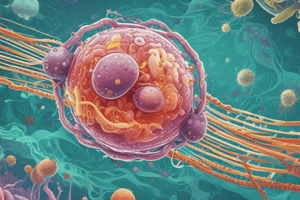Podcast
Questions and Answers
What is the main focus of protozoology?
What is the main focus of protozoology?
Which of the following classifications includes only bacteria?
Which of the following classifications includes only bacteria?
What is the correct order of taxonomic classification starting from the broadest category?
What is the correct order of taxonomic classification starting from the broadest category?
Which statement accurately describes prokaryotic cells?
Which statement accurately describes prokaryotic cells?
Signup and view all the answers
What role does genetic engineering play in modern microbiology?
What role does genetic engineering play in modern microbiology?
Signup and view all the answers
Which pioneer is known for introducing antiseptics in surgery?
Which pioneer is known for introducing antiseptics in surgery?
Signup and view all the answers
What is the primary composition of the cell wall in prokaryotic cells?
What is the primary composition of the cell wall in prokaryotic cells?
Signup and view all the answers
In which kingdom would you find molds and yeasts classified?
In which kingdom would you find molds and yeasts classified?
Signup and view all the answers
What is Microbiology primarily concerned with?
What is Microbiology primarily concerned with?
Signup and view all the answers
Which branch of Microbiology is concerned with infections produced by microorganisms?
Which branch of Microbiology is concerned with infections produced by microorganisms?
Signup and view all the answers
What role do microbes play in digestion?
What role do microbes play in digestion?
Signup and view all the answers
Which of the following microorganisms is studied in Mycology?
Which of the following microorganisms is studied in Mycology?
Signup and view all the answers
What is the primary focus of Pharmaceutical microbiology?
What is the primary focus of Pharmaceutical microbiology?
Signup and view all the answers
What significant role do microbes play in the environment?
What significant role do microbes play in the environment?
Signup and view all the answers
Which of the following best describes Bacteriology?
Which of the following best describes Bacteriology?
Signup and view all the answers
Which branch of microbiology mainly investigates food spoilage and fermentation?
Which branch of microbiology mainly investigates food spoilage and fermentation?
Signup and view all the answers
Study Notes
Definition of Microbes
- "Micro" means small, "bios" means life, and "ology" refers to science; together defining microbiology as the study of microscopic living organisms.
- Microbes include bacteria, which are often labeled "germs," but many are beneficial, aiding in vitamin production and waste breakdown.
- Essential for digestion, soil fertility, and oxygen production; without them, life processes would be severely disrupted.
Disciplines of Microbiology
- Basic Microbiology: Fundamental studies of microorganisms.
- Medical Microbiology: Focuses on pathogens and host responses to infections.
- Pharmaceutical Microbiology: Involves drug development and the use of microbes for producing pharmaceuticals like antibiotics and amino acids.
- Veterinary Microbiology: Examines infectious microorganisms in animals.
- Agricultural Microbiology: Studies microorganisms that affect plants, including pathogens.
- Food Microbiology: Concerned with spoilage, food fermentation, and foodborne diseases.
- Ecological Microbiology: Investigates microorganisms' roles and distribution in environments.
Subfields by Microorganism Type
- Bacteriology: Study of bacteria.
- Virology: Focus on viruses.
- Mycology: Examines fungi.
- Phycology: Study of algae.
- Protozoology: Focus on protozoa.
Interdisciplinary Relations
- Immunology: Studies host responses to pathogens.
- Parasitology: Focuses on parasites and parasitic insects.
- Biotechnology: Use of microorganisms in industry.
- Pathology: Studies diseases in relation to microorganisms.
- Genetic Engineering: Manipulation of microorganisms for protein production via recombinant DNA technology.
Nomenclature & Taxonomy
- Microorganisms classified into several hierarchical ranks: Kingdoms, Divisions, Classes, Orders, Families, Genera, and Species.
- Species can have strains, defined as genetically identical descendants of a single cell.
- Genus (capitalized) and species (lowercase) names must be italicized or underlined.
- Classification systems evolved from two kingdoms (Linnaeus) to five kingdoms (Whittaker).
Whittaker Classification
- Kingdom Animalia: Includes animals.
- Kingdom Plantae: Encompasses plants and multicellular algae.
- Kingdom Protista: Covers protozoa and single-celled algae.
- Kingdom Fungi: Contains molds and yeasts.
- Kingdom Monera: Only bacteria, including Eubacteria, Archaebacteria, and Cyanobacteria.
Eukaryotes vs. Prokaryotes
- Prokaryotic Cells: Smaller, lack a defined nucleus, and have a single/circular chromosome. They reproduce asexually through binary fission and generally have no mitochondria or endoplasmic reticulum.
- Eukaryotic Cells: Larger, contain a defined nucleus, multiple/linear chromosomes, and reproduce sexually or asexually. They have complex structures, including mitochondria and endoplasmic reticulum.
Pioneers in Microbiology
- Antonie Van Leeuwenhoek: First to observe microbes with a microscope, calling them "animalcules."
- Joseph Lister: Developed antiseptics for surgical procedures.
- John Tyndall: Introduced Tyndallization, an intermittent sterilization process.
- Louis Pasteur: Known as the "Father of Bacteriology" for significant contributions to microbiology, including pasteurization.
Studying That Suits You
Use AI to generate personalized quizzes and flashcards to suit your learning preferences.
Description
This quiz covers the basic concepts of microbiology, including the definition and importance of microbes. It highlights the role of bacteria in human health and the environment, explaining how some microbes can be beneficial. Test your knowledge about these tiny organisms and their contributions to life.





